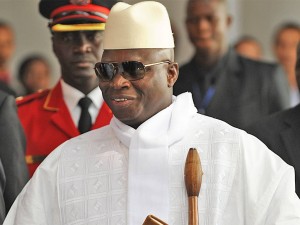Monday marked exactly nineteen years since President Yahya Jammeh became leader of The Gambia by deposing his predecessor, Sir Dawda Kairaba Jawara, in a bloodless coup on 22 July 1994.
At the time, few people gave him a chance but, nineteen years on, he has no doubt weathered the storm and learnt a lot on the job.
Since President Jammeh took up the reins in July 1994, there has been tremendous improvement in the social sector. There are more hospitals and health centres now than ever before; just as there has been an explosion of schools all around the country. For the first time in the country’s history, Gambians are now able to acquire university education on home soil.
The country has over the years seen home-trained medical doctors, trained at the medical school of the University of The Gambia (UTG), pass out. And the UTG has expanded so rapidly as to now have a Law Faculty.
The road network has also improved remarkably. And in the telecommunications sector, there are now four GSM companies operating successfully in The Gambia.
But transportation is still in a difficult state, especially with the absence of Gambia Public Transport Corporation (GPTC) buses on the road. Critics say they need to come back on the road to ease the mounting transport difficulties faced by commuters day after day.
In the same vein, there is a need for newer ferries to ease the difficulties faced by thousands of people daily in trying to cross between Banjul and Barra.
The government together with Gambia International Airlines (GIA) and the Gambia Civil Aviation Authorities (GCAA) should work out ways of reducing air fares so that prospective travellers do not have to go to Dakar, Senegal, where air fares are generally cheaper.
At the same time, farmers should be made to feel confident that their produce will be bought at the end of the day. This will encourage them to engage more seriously in agricultural production.
At the international level, Gambians need to work hard on relations with other ECOWAS countries, particularly neighbouring Senegal, by opening a dialogue with them to thrash out any misunderstandings.
On the human rights front, the issues are numerous, including the issue of crime suspects being remanded without trial for an unduly long time, which needs to be addressed. The same applies to the matter of people acquitted and discharged by courts only to be re-arrested and detained.
In the coming years, Gambians would like to see the rule of law given pride of place in the spirit of good governance. In this case, due process must be followed at all times so that human rights are always seen to be respected.
Gambians will be happy to see that no one is detained for more than 72 hours without trial.
Civil servants would also like to see a Gambia where they can belong to the opposition without any fear of losing their jobs.
After 19 years of APRC rule, there is need for greater tolerance and accommodation of those always pejoratively termed as “unpatriotic” simply because they are opposition supporters.
Gambians are also calling for amendments to the laws which adversely affect the operations of the media and work of journalists in The Gambia, such as the recent amendments to the Information and Communications Act, should be repealed without delay. Government should further widen its doors to all the independent press.










